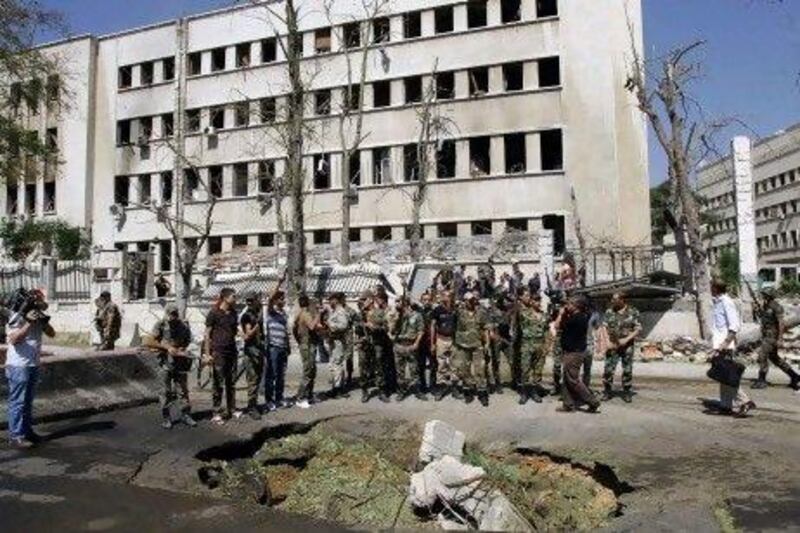DAMASCUS // Rebel fighters attacked the headquarters of Syria's national army command in the centre of Damascus yesterday, exploding two powerful bombs at the heavily defended compound and setting the building on fire.
The force of the blasts shook the capital at 7am and there was sporadic gunfire for hours afterwards as rebels and regime troops fought street battles.
As thick black smoke poured into the sky, regime troops quickly sealed the area off, making it impossible to accurately gauge the full extent of any damage. Online video footage showed fierce fires burning on at least two upper floors.
There were unconfirmed reports that rebel fighters infiltrated the compound and fought their way into the building.
Umran Zaubie, Syria's information minister, said some soldiers had been wounded but he rejected rumours that senior army officers had been killed, and said no army staff commanders had been hurt.
"It's a terrorist act, close to an important site, that's true. But as usual they failed to achieve their goal," he said.
Army sources said a car bomb and another explosive device had been used, and four guards had been killed. State television showed video footage of a white van exploding next to the headquarters, followed 10 minutes later by a second blast inside the compound.
A Syrian journalist, Maya Nasser, 33, a correspondent for Iran's English-language Press TV, was shot dead by a sniper.
Journalists, pro-regime, anti-regime and independent, have been routinely targeted in the course of the conflict.
"This heinous crime will enhance the determination of our armed forces in confronting terrorism and crushing all those who attempt to tamper with the security of the homeland and the citizens," an unnamed military officer told Sana, the official news agency.
Tajamo Ansar Al Islam (Gathering of Partisans of Islam) said it carried out the attack. Five of its fighters, including a suicide bomber, were killed, the group said.
The attack comes after weeks in which regime forces had bombarded then finally advanced into some of the densely populated suburbs of Damascus where rebels had carved out strongholds.
Touting the success of those operations, regime officials had spoken confidently of delivering a significant, perhaps even decisive, setback to rebel forces in the capital.
In some areas, including the upmarket Mezze district - near the army command headquarters - checkpoints had been removed, a step residents had interpreted as a show of strength by the government.
But the Free Syrian Army, the umbrella group under whose banner most of the rebel factions fight, had promised it would respond and bring the war to the seat of the regime power in the capital. Yesterday it did.
Army headquarters is next door to the main offices of the ruling Baath party, which neighbours an Air Force command centre, all potent emblems of Bashar Al Assad's regime.
Even before the uprising began in March, the area was heavily protected by red-capped military police units, measures that had subsequently been reinforced with road closures and plain-clothes security officers.
Army headquarters faces Omayyad Square, the Syrian capital's equivalent of Trafalgar Square in London or Times Square in New York - a highly symbolic zone the Syrian authorities have long sought to show as effortlessly under their control.
Syrian state-run television is also in the square, with live footage showing all is calm in the area typically used as a backdrop to the morning chat show - a reminder to viewers of the government's message that it is comfortably winning its war and that Damascus is in no danger of falling into rebel hands.
In the early months of the uprising, opposition protesters had sought to converge on Omayyad Square and stage a permanent sit-in, similar to that used so successfully by Egyptian demonstrators at Tahrir Square in Cairo to topple Hosni Mubarak last year.
In Syria, however, the protesters never even arrived, their marches violently broken up by security forces. Instead, pro-regime rallies were staged there, including one in which Mr Al Assad made a rare public appearance.
While attention focused on the Damascus attack - the most audacious since July 18, when a bomb inside the national security officers killed leading regime officials, including the president's brother in law, Asef Shawkat - violence raged yesterday across Syria.
More than 200 people were killed, 137 of them in the capital and its surrounding area, according to the Local Coordination Committees, a network of grassroots activists. They said up to 107 people had been massacred by regime forces in Thiabieh, south-east of the capital.
The Syrian Observatory for Human Rights, a British-based group monitoring the death toll, said it had been able to confirm 40 dead there, but warned the real number could be higher.
Activists also said 16 people were executed by a pro-regime militia in Barzeh, north-east Damascus, yesterday morning. A largely Sunni district that has been heavily involved in the uprising, Barzeh lies next to a predominantly Alawite neighbourhood of Aish Al Warwar, with alarm growing over sectarian tensions there.
Yesterday's bloodshed brought the death toll since March 2011, when the revolt began, to more than more than 30,000 people, the Observatory said.
Egypt's president, Mohammed Morsi cancelled a meeting of four regional powers on the Syria crisis yesterday because of the absence of Turkey's prime minister from this week's UN General Assembly.
The Tunisian president Moncef Marzouk said his country would support an Arab peacekeeping force in Syria.
"A peacekeeping operation by Arab nations is something we could well imagine," Mr Marzouki said at the UN General Assembly in New York. "We have really pushed for a peaceful solution, but if it is necessary, it must be an Arab peacekeeping force, yes."
He was speaking a day after the emir of Qatar called for an Arab intervention in Syria and a no-fly zone to protect refugees.
* With additional reporting by Associated Press, Agence France-Presse and Reuters





